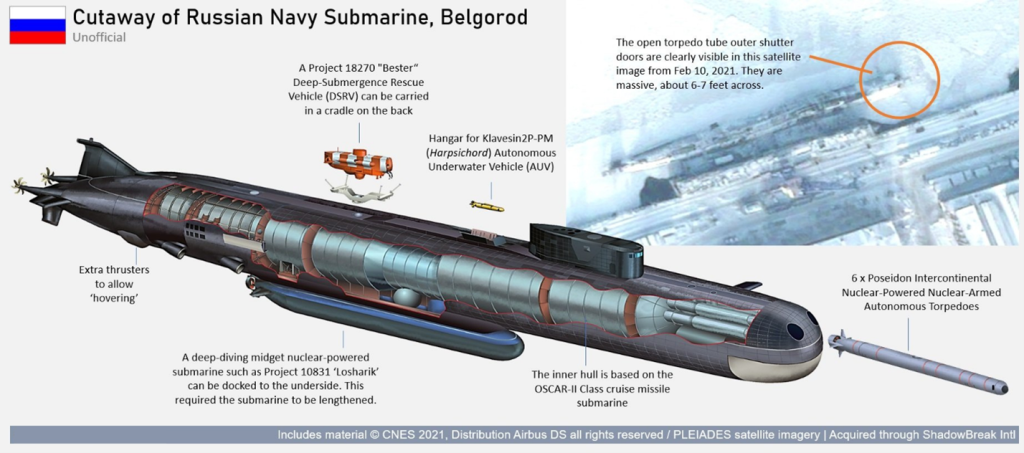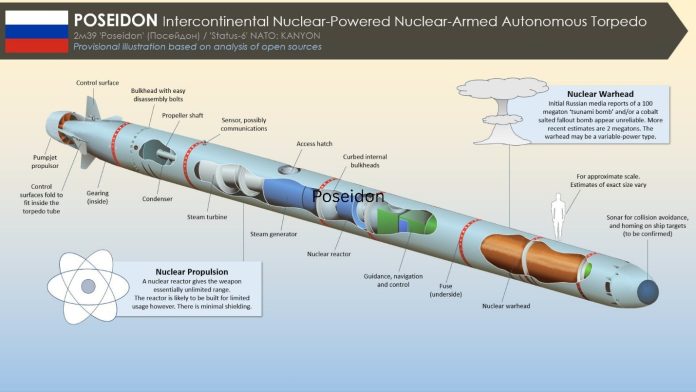By Sanindu Fonseka, Independent Defence Analyst
In the silent depths of the world’s oceans, a new and unsettling chapter in nuclear deterrence is being written. Russia’s Poseidon—a nuclear-powered, nuclear-armed underwater drone—is not just another weapon; it is a strategic puzzle forcing militaries and policymakers to rethink the very foundations of global security.
A Ghost in the Deep
Forget the familiar arc of an intercontinental ballistic missile. The threat posed by Poseidon, known in intelligence circles as Status-6, is far more stealthy and, for now, far more difficult to counter.
Imagine an autonomous vehicle the size of a school bus, powered by a miniature nuclear reactor, travelling thousands of kilometres across the ocean floor. It is engineered to dive to depths of nearly 1,000 metres—a realm where most current anti-submarine detection networks go blind.
“We’re dealing with a fundamental shift,” says Dr Alistair Finch, a former naval strategist now with the Global Security Institute. “This isn’t a torpedo; it’s an intercontinental, nuclear-armed submarine without a crew. Its ability to operate silently in the deep abyss places it in a category of its own.”
More Than a Bomb: A Coastal Cataclysm
The drone’s payload is what transforms it from a tactical threat into a strategic one. Analysts believe it carries a multi-megaton nuclear warhead, a weapon of immense destructive power. But its intended effect is what truly concerns emergency planners.
Instead of a traditional airburst, a Poseidon device could be detonated off a coastline.
The result, experts warn, would be catastrophic: a radioactive tsunami designed to smash into port cities, destroy critical naval infrastructure—including home-ported aircraft carriers—and render vast coastal regions uninhabitable for decades due to severe contamination. For the millions living in major coastal population centres, the scenario reads like a nightmare resurrected from the darkest moments of the Cold War.
The “Unstoppable” Dilemma
What alarms defence planners most is Poseidon’s perceived invulnerability. With its extreme depth, high speed, and near-unlimited range, there is currently no reliable way to track or intercept it once deployed.
“To call any weapon ‘unstoppable’ is a dangerous game, but Poseidon’s specs are a defence planner’s worst headache,” a NATO naval officer, who spoke on condition of anonymity, told us. “We are playing catch-up in a domain we thought we controlled. The race is now on to develop new deep-sea sensors and countermeasures, but that will take years and billions of dollars.”
The Human Element: A Message from Moscow
Beyond its technological significance, Poseidon is a powerful political symbol. Its development—shrouded in secrecy and counter-intelligence—signals Moscow’s determination to expand its strategic arsenal despite sanctions and diplomatic pressure.
“This is Putin’s way of ensuring Russia’s seat at the top table,” explains Maria Kovaleva, a senior fellow at the Center for European Policy Analysis. “It’s a weapon meant to terrify and deter. It says, ‘Your missile defences are irrelevant; I can hold your cities at risk from the ocean floor.’ It’s a brutal but effective negotiating card.”

Global Ripples
The emergence of Poseidon sends shockwaves far beyond NATO–Russia relations. It challenges existing arms control treaties, none of which were designed to regulate autonomous nuclear-delivery systems. It accelerates militarisation in the resource-rich Arctic, where Russia has conducted tests. And it almost certainly guarantees a new, shadowy underwater arms race.
“The genie is out of the bottle,” Dr Finch concludes. “Other major powers will now feel compelled to develop their own versions—or pour immense resources into finding a way to kill this thing. We are witnessing the birth of a new leg in the nuclear triad, and the rules for this game have yet to be written.”
For now, military strategists are left staring at the waves, fully aware that the next great threat to global stability may already be on patrol—silent and unseen in the dark below.




